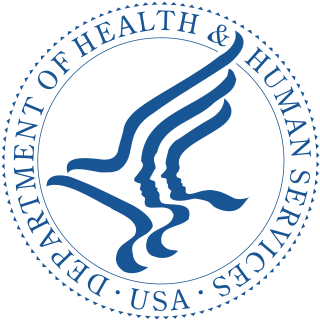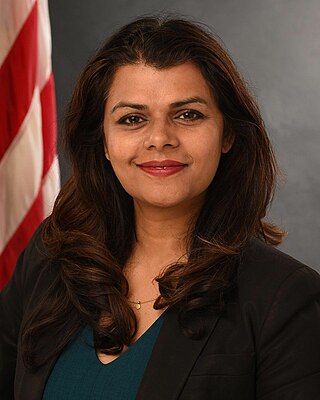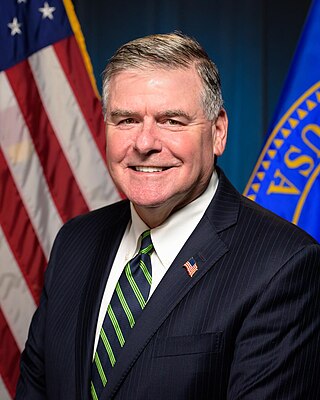
The United States secretary of health and human services is the head of the United States Department of Health and Human Services, and serves as the principal advisor to the president of the United States on all health matters. The secretary is a member of the United States Cabinet. The office was formerly Secretary of Health, Education, and Welfare. In 1980, the Department of Health, Education, and Welfare was renamed the Department of Health and Human Services, and its education functions and Rehabilitation Services Administration were transferred to the new United States Department of Education. Patricia Roberts Harris headed the department before and after it was renamed.

The United States Department of Health and Human Services (HHS) is a cabinet-level executive branch department of the U.S. federal government created to protect the health of the U.S. people and providing essential human services. Its motto is "Improving the health, safety, and well-being of America". Before the separate federal Department of Education was created in 1979, it was called the Department of Health, Education, and Welfare (HEW).

Louis Wade Sullivan is an active health policy leader, minority health advocate, author, physician, and educator. He served as the Secretary of the United States Department of Health and Human Services during President George H. W. Bush's Administration and was Founding Dean of the Morehouse School of Medicine.

The American College of Cardiology (ACC), based in Washington, D.C., is a nonprofit medical association established in 1949. It bestows credentials upon cardiovascular specialists who meet its qualifications. Education is a core component of the college, which is also active in the formulation of health policy and the support of cardiovascular research.

The Health Resources and Services Administration (HRSA) is an agency of the U.S. Department of Health and Human Services located in North Bethesda, Maryland. It is the primary federal agency for improving access to health care services for people who are uninsured, isolated or medically vulnerable.

The Indian Health Service (IHS) is an operating division (OPDIV) within the U.S. Department of Health and Human Services (HHS). IHS is responsible for providing direct medical and public health services to members of federally recognized Native American Tribes and Alaska Native people. IHS is the principal federal health care provider and health advocate for Indian people.
Stewart Simonson is the Assistant Director-General of the World Health Organization responsible for the WHO Office at the United Nations and the WHO-US Liaison Office. He also serves as the Director-General's Special Representative for UN Reform. Prior to his assignment in New York, Simonson was the Assistant Director-General for the General Management Group at WHO headquarters in Geneva, Switzerland.

The Comprehensive Drug Abuse Prevention and Control Act of 1970, Pub. L.Tooltip Public Law 91–513, 84 Stat. 1236, enacted October 27, 1970, is a United States federal law that, with subsequent modifications, requires the pharmaceutical industry to maintain physical security and strict record keeping for certain types of drugs. Controlled substances are divided into five schedules on the basis of their potential for abuse, accepted medical use, and accepted safety under medical supervision. Substances in Schedule I have a high potential for abuse, no accredited medical use, and a lack of accepted safety. From Schedules II to V, substances decrease in potential for abuse. The schedule a substance is placed in determines how it must be controlled. Prescriptions for drugs in all schedules must bear the physician's federal Drug Enforcement Administration (DEA) license number, but some drugs in Schedule V do not require a prescription. State schedules may vary from federal schedules.

Signed into effect on 12 June 2002, the Public Health Security and Bioterrorism Preparedness and Response Act of 2002 (PHSBPRA) was signed by the President, the Department of Health and Human Services (DHHS) and the U.S. Department of Agriculture (USDA).

Steven Kenneth Galson is an American public health physician. He is currently a Senior Advisor at the Boston Consulting Group and Independent Board Member at Biocryst Pharmaceuticals and Elephas Biosciences. Until 2021 he was Senior Vice President for Research and Development at Amgen, the California-based biopharmaceutical company. He is also a Trustee and Professor-at-Large at the Keck Graduate Institute for Applied Life Sciences in Claremont, California. He is a retired rear admiral in the United States Public Health Service Commissioned Corps and public health administrator who served as the acting Surgeon General of the United States from October 1, 2007 – October 1, 2009. He served concurrently as acting Assistant Secretary for Health from January 22, 2009 to June 25, 2009, and as the Deputy Director and Director of the Center for Drug Evaluation and Research (CDER) at the Food and Drug Administration from 2001 to 2007. As the Acting Surgeon General, he was the commander of the United States Public Health Service Commissioned Corps and, while serving as the Assistant Secretary for Health, was the operational head of the Public Health Service.

The Biomedical Advanced Research and Development Authority (BARDA)' is a U.S. Department of Health and Human Services (HHS) office responsible for the procurement and development of medical countermeasures, principally against bioterrorism, including chemical, biological, radiological and nuclear (CBRN) threats, as well as pandemic influenza and emerging diseases. BARDA was established in 2006 through the Pandemic and All-Hazards Preparedness Act (PAHPA) and reports to the Office of the Assistant Secretary for Preparedness and Response (ASPR). The office manages Project BioShield, which funds the research, development and stockpiling of vaccines and treatments that the government could use during public health emergencies such as chemical, biological, radiological or nuclear (CBRN) attacks.

On December 19, 2006, the Pandemic and All-Hazards Preparedness Act (PAHPA), Public Law No. 109-417, was signed into law by President George W. Bush. First introduced in the House by Rep. Mike Rogers (R-MI) and Rep. Anna Eshoo (D-CA), PAHPA had broad implications for the United States Department of Health and Human Services's (HHS) preparedness and response activities. Among other things, the act amended the Public Health Service Act to establish within the department a new Assistant Secretary for Preparedness and Response (ASPR); provided new authorities for a number of programs, including the advanced development and acquisitions of medical countermeasures; and called for the establishment of a quadrennial National Health Security Strategy.

Eric Goosby is an American public health official, currently serving as the UN Special Envoy on Tuberculosis. Goosby previously served as the United States Global AIDS Coordinator from 2009 until mid-November 2013. In the role, Goosby directed the U.S. strategy for addressing HIV around the world and led President Obama's implementation of the President's Emergency Plan for AIDS Relief (PEPFAR). Goosby was sworn in during June 2009 and resigned in November 2013, taking a position as a professor at UCSF, where he directs the Center for Global Health Delivery and Diplomacy, a collaboration between UCSF and the University of California, Berkeley.

Nicole Lurie is an American physician, professor of medicine, and public health leader. She is Executive Director for Preparedness and Response at the Coalition for Epidemic Preparedness Innovations (CEPI) and Director of CEPI-US. She is also a Lecturer at Harvard Medical School and Adjunct Professor at the George Washington University School of Medicine. During the administration of President Barack Obama, she was Assistant Secretary for Preparedness and Response (ASPR) at the United States Department of Health and Human Services (HHS) from 2009 through the end of the president's second term. The mission of the Office of the Assistant Secretary for Preparedness and Response is to "lead the nation in preventing, responding to and recovering from the adverse health effects of public health emergencies and disasters, ranging from hurricanes to bioterrorism."

Yvette Roubideaux is an American doctor and public health administrator. She is a member of the Rosebud Sioux Tribe of South Dakota.

Vanila M. Singh is an American physician and professor with involvement in United States health policy. Singh was a candidate for the United States House of Representatives in 2014. Early in her career she taught at UCLA Medical Center, and she is currently an associate professor of anesthesiology, perioperative and pain medicine at Stanford University Medical Center. On June 12, 2017, she was appointed the chief medical officer to the Office of the Assistant Secretary for Health at the U.S. Department of Health and Human Services, a presidential appointment at the Senior Executive Service level. She served as Chair of the Inter-Agency Pain Management Task Force established by the CARA Act of 2016, which released its final report on acute and chronic pain management best practices on May 30, 2019. Dr. Singh was also appointed as the Acting Regional Health Administrator in Region 9 in August 2018.

Crimson Contagion was a joint exercise conducted from January to August 2019, in which numerous national, state and local, private and public organizations in the US participated, in order to test the capacity of the federal government and twelve states to respond to a severe pandemic of influenza originating in China.

Thomas J. Engels is an American politician who served as the Administrator of the Health Resources and Services Administration of the United States Department of Health and Human Services from 2019 to 2021.

Mandy Krauthamer Cohen is an American internist, public health official, and healthcare executive serving as the director of the U.S. Centers for Disease Control and Prevention (CDC) since July 10, 2023. She was previously the executive vice president at Aledade and chief executive officer of Aledade Care Solution, a healthcare company.

Carole Johnson is an American health official serving as the administrator of Health Resources and Services Administration since January 2022. She was previously a member of the White House COVID-19 Response Team. Johnson is a former commissioner of the New Jersey Department of Human Services.

















